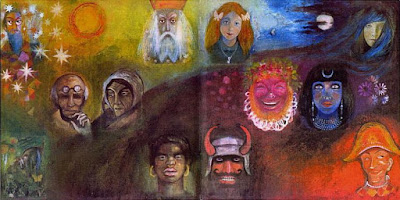READING:
1. Books I read this summer:
-How to Read Literature Like a Professor by Thomas Foster
-The Brief Wondrous Life of Oscar Wao by Junot Diaz
-Goldengrove by Francine Prose
-The Pity of it All by Amos Elon
2. All other things I read:
-Articles in Seventeen magazine
-A few chapters of about 4 other books
-Blog (created by myself and 2 others) and websites on Renewal of the Jewish Community in Berlin (for a program)
3. none
4. I like to concentrate when I read, so that usually requires a quiet space. I also like to read large amounts at a time, sometimes even a whole day. I sometimes do spread out my reading though. Before I read, I sometimes go back and read a couple paragraphs so I remember what is happening. I don't really do anything after I read usually (unless there is homework).
WRITING:
I am generally a good writer. I am good at grammar and punctuation. I could work on my vocabulary more. Sometimes it is hard for me to organize my thoughts into an outline. However, once in that format, I stick to the topic and my ideas are organized well.
THINKING:
One of my strengths is my "capacity to work hard and to expect high standards." I see this as a strength because working hard always leads to success. Even if I'm not the smartest person in the class, I can work hard to understand the book or do the assignment just as well. Having high standards for myself is key to doing well in any academic situation. Having too high of standards can hinder success though. I can't let a bad grade get me down and stop me from trying. I should learn from the experience and just work that much harder.
One of my weaknesses is not contributing to class discussions. I tend to be quiet and like to observe rather than participate. I am trying to work on this. Not participating in class discussions is bad because then I don't get to share my ideas with the class. Therefore, the others cannot learn for me, and they cannot disagree and start an intelligent conversation or debate with me. In addition, not contributing more is hindering my education because I am not getting all of my questions answered.
ACADEMIC LITERACY:
Main ideas:
1. Students are more willing to do the work and be diligent, but less willing to communicate and ask questions.
2. Critical thinking abilities need to be taught. They are crucial and should be encouraged.
3. Students should be exposed to many types of rhetorical strategies so they can develop their own.
Respond:
I agree with the ideas in the excerpt. I have experienced this first hand. I am very willing to out in the hard work, yet I am less willing to question and communicate. I see this among many of my peers as well. I have also heard several teachers bring up this dilemma and agree with what is stated in the excerpt.
 acter sees is a crucial motive for actions throughout Frankenstein. It the climax of the novel, when the monster pleads with Frankenstein to create a companion for himself, Frankensteingains compassion and agrees to create a companion only after struggling with indecision. Every time Frankenstein would look at the monster, he would not comply with he monster's desire, but when he only heard the monster, he would regain his compassion and agree to create a companion.
acter sees is a crucial motive for actions throughout Frankenstein. It the climax of the novel, when the monster pleads with Frankenstein to create a companion for himself, Frankensteingains compassion and agrees to create a companion only after struggling with indecision. Every time Frankenstein would look at the monster, he would not comply with he monster's desire, but when he only heard the monster, he would regain his compassion and agree to create a companion. 











